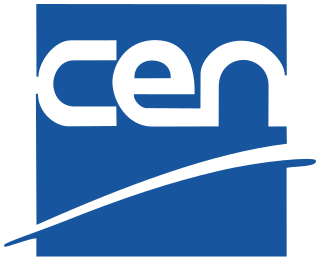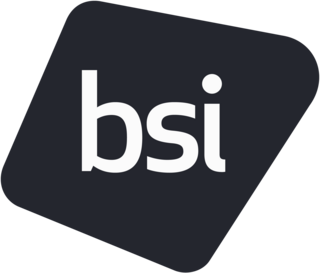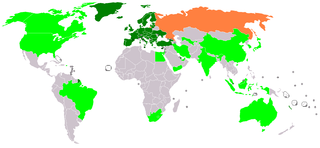
The International Organization for Standardization is an independent, non-governmental, international standard development organization composed of representatives from the national standards organizations of member countries. Membership requirements are given in Article 3 of the ISO Statutes.
An international standard is a technical standard developed by one or more international standards organizations. International standards are available for consideration and use worldwide. The most prominent such organization is the International Organization for Standardization (ISO). Other prominent international standards organizations including the International Telecommunication Union (ITU) and the International Electrotechnical Commission (IEC). Together, these three organizations have formed the World Standards Cooperation alliance.

CENELEC is responsible for European standardization in the area of electrical engineering. Together with ETSI (telecommunications) and CEN, it forms the European system for technical standardization. Standards harmonised by these agencies are regularly adopted in many countries outside Europe which follow European technical standards. Although CENELEC works closely with the European Union, it is not an EU institution. Nevertheless, its standards are "EN" EU standards, thanks to EU Regulation 1025/2012.

The European Committee for Standardization is a public standards organization whose mission is to foster the economy of the European Single Market and the wider European continent in global trading, the welfare of European citizens and the environment by providing an efficient infrastructure to interested parties for the development, maintenance and distribution of coherent sets of standards and specifications.
ISO/IEC 15897 is an ISO/IEC standard for the registration of new POSIX locales and POSIX charmaps. This standard is the result of a "fast-track" adoption of CEN ENV 12005, a European prestandard published by CEN. It was originally published in 1999, and a second edition was published in 2011.
Accreditation is the independent, third-party evaluation of a conformity assessment body against recognised standards, conveying formal demonstration of its impartiality and competence to carry out specific conformity assessment tasks.

ANEC, formally The European consumer voice in standardisation, is an organisation promoting and defending the collective European consumer interest in the process of standardization, and in related fields such as conformity assessment (e.g.certification), market surveillance and enforcement. ANEC also aims to influence legislation that makes reference to standards or standardization. In November 2008, ANEC adopted the strapline 'Raising Standards for Consumers' as part of an initiative to improve the visibility of the association. On 15 March 2018, World Consumer Rights' Day, ANEC launched a short video to explain its role and highlight some of its successes.
European Standards, sometimes called Euronorm, are technical standards which have been ratified by one of the three European Standards Organizations (ESO): European Committee for Standardization (CEN), European Committee for Electrotechnical Standardization (CENELEC), or European Telecommunications Standards Institute (ETSI). All ENs are designed and created by all standards organizations and interested parties through a transparent, open, and consensual process.
The European Committee for Standardization (CEN) Standard Architecture for Healthcare Information Systems, Health Informatics Service Architecture or HISA is a standard that provides guidance on the development of modular open information technology (IT) systems in the healthcare sector. Broadly, architecture standards outline frameworks which can be used in the development of consistent, coherent applications, databases and workstations. This is done through the definition of hardware and software construction requirements and outlining of protocols for communications. The HISA standard provides a formal standard for a service-oriented architecture (SOA), specific for the requirements of health services, based on the principles of Open Distributed Processing. The HISA standard evolved from previous work on healthcare information systems architecture commenced by Reseau d’Information et de Communication Hospitalier Europeen (RICHE) in 1989, and subsequently built upon by a number of organizations across Europe.
The Spanish Association for Standardization and Certification is an entity dedicated to the development of Standardization and Certification in all Spanish industrial and service sectors.

The British Standards Institution (BSI) is the national standards body of the United Kingdom. BSI produces technical standards on a wide range of products and services and also supplies certification and standards-related services to businesses.
ISO/IEC 17024: Conformity assessment - General requirements for bodies operating certification of persons is an ISO/IEC standard which specifies criteria for the operation of a personnel certification body. The standard includes requirements for the development and maintenance of the certification scheme for persons upon which the certification is based.
Transport standards organisations is an article transport Standards organisations, consortia and groups that are involved in producing and maintaining standards that are relevant to the global transport technology, transport journey planning and transport ticket/retailing industry. Transport systems are inherently distributed systems with complex information requirements. Robust modern standards for transport data are important for the safe and efficient operation of transport systems. These include:

The European Telecommunications Standards Institute (ETSI) is an independent, not-for-profit, standardization organization operating in the field of information and communications. ETSI supports the development and testing of global technical standards for ICT-enabled systems, applications and services.

The Ministry of Enterprises and Made in Italy, commonly known under the shortening of its pre-2022 name, MISE, is a government ministry of the Italian Republic. It deals with production, economic activities, energy and mineral resources, telecommunications, consumers, tourism, internationalisation and business incentives. It was formed in 2006 after the reorganization of the Ministry of Productive Activities to which were merged the Ministry of Communications and the Ministry of International Trade in 2008.
CEN/CENELEC Guide 6: Guidelines for standards developers to address the needs of older persons and persons with disabilities is a document for participants in standardisation activities at CEN and CENELEC that contains guidance for the creation and the revision of standards to ensure greater accessibility of products and services. The document is a "Guide", in other words, not a European Standard (EN). The guide is identical to ISO/IEC Guide 71 and was adopted by both the CEN Technical Board and the CENELEC Technical Board, and published in January 2002. The adoption of CEN/CENELEC Guide 6 resulted from a European mandate to the European standardisation organisations, and the European Commission is funding projects to promote the use of the Guide.
ISO/IEC JTC 1/SC 27 Information security, cybersecurity and privacy protection is a standardization subcommittee of the Joint Technical Committee ISO/IEC JTC 1 of the International Organization for Standardization (ISO) and the International Electrotechnical Commission (IEC). ISO/IEC JTC 1/SC 27 develops International Standards, Technical Reports, and Technical Specifications within the field of information security. Standardization activity by this subcommittee includes general methods, management system requirements, techniques and guidelines to address information security, cybersecurity and privacy. Drafts of International Standards by ISO/IEC JTC 1 or any of its subcommittees are sent out to participating national standardization bodies for ballot, comments and contributions. Publication as an ISO/IEC International Standard requires approval by a minimum of 75% of the national bodies casting a vote. The international secretariat of ISO/IEC JTC 1/SC 27 is the Deutsches Institut für Normung (DIN) located in Germany.

The Cyprus Organisation for Standardisation, or CYS, is the national standardisation body of Cyprus, whose principal activity is the production of standards and the supply of standards-related services.
EN 16114 "Management consultancy services" is a standard published by the European Committee for Standardization (CEN) on September 28, 2011. It focuses on the providing of management consulting services by management consultancy service providers (MCSPs).
ISO Technical Committee 67 – Oil and gas industries including lower carbon energy is a technical committee within the International Organization for Standardization (ISO). ISO/TC 67 is responsible for developing and maintaining international standards in the worldwide upstream, midstream and downstream oil and gas industry and related lower carbon energy activities. Its role encompasses the harmonisation of standards for facilities, equipment and operations used for drilling, production, pipeline transport and processing of liquids and gaseous hydrocarbons on, and between, offshore oil and gas installations and onshore terminals and oil refineries.








